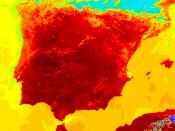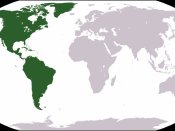Argentina belongs to the Americas, and is therefore part of what Europeans used to call the "New World". When the Europeans arrived in Argentina in 1502, the only inhabitants all over the continent were indigenous people, and although the European colonizers only started showing up in South America around the beginning of the sixteenth century, the lives of many if not all the 20 major groups of Argentinean indigenous people were made different, in a way both positively and negatively. Up until about 200 years ago in the early period of the nineteenth century, all of South America was ruled by Spain and Portugal, which is why the languages that are spoken nowadays are Spanish and Portuguese. Today, the three main groups that form the population of Argentina are descendants of the European colonizers, native indigenous people and people of mixed descent which seems to be perfectly satisfactory for the people of Argentina. By revealing the points of view of both the European colonizers and the native indigenous people and discussing different pieces of evidence I will answer my research question as accurately as my sources will allow me to.
When Colombus' discovery was first heard of in Europe, a conflict arose between Spain and Portugal. This happened because they had both been promised permission by the Pope to colonize this area, but they were unable to come to an agreement until the Americas were basically cut in half and the Portuguese were only left with Brazil, whilst the Spaniards got the rest, which is how it was Spain that had come to colonize Argentina. Although Argentina was not one of the richest in natural resources (among these are cloth, mules, good land for agriculture) the country was useful enough to be able to keep the Spaniards satisfied enough...


